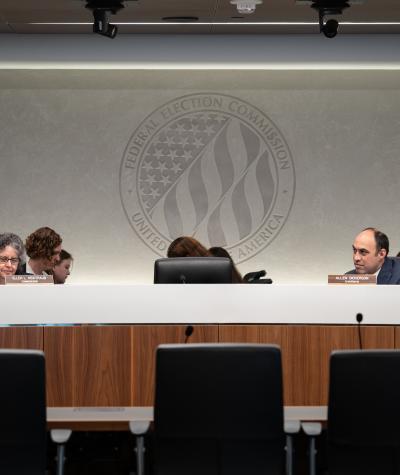The federal campaign finance laws that prohibit federal contractors from making political contributions stand as a bulwark against corrupt, “pay to play” style politics and assure voters that taxpayer-funded government contracts are not for sale.
This protection is vital to rooting out corruption in our democracy and the enforcement of these laws creates accountability and serves as a deterrent for government contractors that might also attempt to unlawfully influence our elections.
In 2022, Campaign Legal Center (CLC) filed a complaint with the Federal Election Commission (FEC) alleging that the medical services company Angel Staffing Inc. violated the federal contractor contribution ban by contributing $250,000 to the super PAC Protect and Serve PAC (PSP) while negotiating or performing under several federal contracts. In similar recent cases, the FEC typically held federal contractors accountable — even if the fines were fairly nominal and unlikely to send a strong deterrent message.
Not so here: In a recent vote, the FEC deadlocked 3-3 and dismissed CLC’s complaint against Angel Staffing, contrary to the recommendation of the FEC’s Office of General Counsel (OGC) to find “reason to believe” Angel Staffing had violated the law.
While all six commissioners acknowledged that Angel Staffing’s contribution was unlawful, the three commissioners who voted against enforcing the law dismissed the violation as merely “technical” and further suggested it should not be enforced because they believed the law itself might be vulnerable in court.
Commissioners Allen Dickerson and Trey Trainor acknowledged that Angel Staffing violated the law. But their reasoning to dismiss focused on what they viewed as mitigating factors, including that Angel Staffing’s president and chief executive officer, Shannon Ralston, unsuccessfully tried to make the contribution from personal funds and then relied on the (incorrect) advice of counsel that she could, instead, draw on an Angel Staffing account.
Vice Chair Sean Cooksey writing separately, similarly focused on Ralston’s errors, while painting Ralston as an inexperienced political contributor who was not intentionally “gaming the system.”
In focusing on Ralston’s errors and intentions, these commissioners ignored the scope and seriousness of the violation: Angel Staffing’s $250,000 contribution constituted over 95% of the funds PSP received during the 2022 election cycle, and PSP, in turn, supported a single congressional candidate whose district adjoins the contractor’s headquarters. At a minimum, this six-figure, illegal contribution created a clear appearance of corruption to voters — a fact that the commissioners should have at least addressed.
It can be appropriate for the FEC (like any law enforcement body) to consider mitigating factors when deciding how to resolve a case. Here, however, the three commissioners’ exclusive focus on those factors as a reason to dismiss a patently illegal $250,000 contribution — which, again, comprised nearly all the funding that this super PAC used to back a single congressional candidate — as a merely “technical” violation unworthy of any enforcement action sends a dangerous message to those who would actively seek to game the system. It downplays the importance of a crucial anticorruption provision that helps protect trust and faith in our electoral process.
Notably, the commissioners declining to enforce the law purported to rely on their own constitutional assessment of the applicable law. Vice Chairman Cooksey boldly stated that “to pursue this violation would have exposed the Commission to a costly defense of the statutory ban’s dubious constitutionality.”
But FEC commissioners are not empowered to assess the constitutionality of federal campaign finance laws. Their statutorily defined role is to interpret, apply, and enforce those laws — and to leave it to the federal courts to determine questions of constitutionality.
The FEC is responsible for applying and enforcing the laws on the books, and there is no dispute that the federal ban on contractor contributions remains intact.
Failure by the FEC to enforce the law here only adds to public skepticism and mistrust about our political system, and it confirms skepticism that those who violate federal campaign finance law will be held accountable. The FEC needs to do its job and enforce the law in order to protect voters’ rights and maintain accountability and integrity in our elections.
This blog was authored by CLC Legal Intern Adam Markhoff
